
88 Writers on the Books They Loved in 2022
The Year in Reading From Contributors to Freeman’s
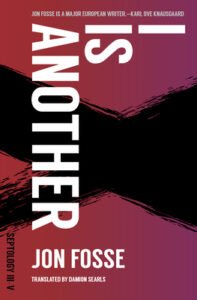
Jon Fosse, I is Another. Septology III-V
Jon Fosse’s I is Another. Septology III-V. I love this second volume in Fosses septology about the widowed painter Asle for its integrity and thematic quality, exploring art, time and the hazard of life. How the long, winding sentence, with its falling and raising sense of unease, the relatively small vocabulary, the use of doppelgänger and the dissolution of time creates a great stillness.
–Linnea Axelsson, author of Ædnan, translated by Saskia Vogel, forthcoming from Knopf in winter 2023
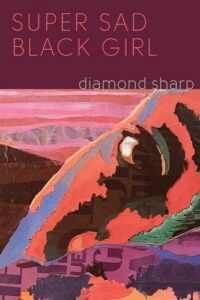
Diamond Sharp, Super Sad Black Girl
I can’t stop thinking about Super Sad Black Girl, the debut collection of poetry by Diamond Sharp. The book’ wrestles with lineage, illness, and endings in deceptively sparse lyrics that live in conversation with the legacies of Gwendolyn Brooks and Lorraine Hansberry, of Rekia Boyd and Sandra Bland, and of Claudia Rankine. “Black Lady Lazarus” mirrors Rankine’s devastating and ongoing list of Black men killed by police violence in its sequence of Black women killed by police violence: “Sandra & Korryn & Breonna & Atatiana & Aiyanna & […].” Sharp devises images of startling and terrible beauty (“I dream of leaving a sea of poppies on my bedroom floor”), confronts the inescapable nature of mental and emotional inheritance (“My illness is an heirloom.”), and obsesses over the relentless gnawing of depression and desperation by repeating single sentences over an entire page: “I’ve spent my whole life running from this birthright.” One of the bravest books of the year, and one that will stay with me for a long, long time.
–Diego Báez is the author of Yaguareté White, forthcoming from University of Arizona Press (2024)
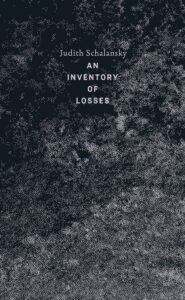
Judith Schalansky, An Inventory of Losses
Feeling both urgent and elusive, timely and unstuck from time, Judith Schalansky’s An Inventory of Losses knocked my socks off this year. Engaging our compulsion to gather and futilely preserve (sometimes only by rumination) things lost to our world—from an extinct species of tiger, to a Murnau film, to a fraught art installation, to a phantasmal island—the book also interrogates the innate structural inadequacies of such repositories—the incompleteness of any archive, of any Voyager Golden Record, and therefore of any stab at collective memory.
I adored navigating Schalansky’s blurring and blending of “fact” and “fiction,”—their necessary and intrinsic non-binariness; their co-existence in the stories we well ourselves about ourselves and the ornaments of our world, and about the looming entropy that’s ever contextualizing each. This is the stuff of dreaminess, but not exactly dream itself.
–Matthew Gavin Frank, author of Flight of the Diamond Smugglers: A Tale of Pigeons, Obsession, and Green Along Coastal South Africa
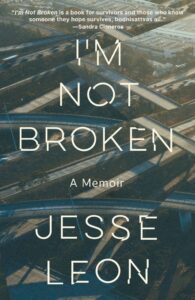
Jesse Leon, I’m Not Broken
I have to say that Jesse Leon’s memoir, I’m Not Broken, is a story that has stayed with me after I read it when it came out this summer. Leon writes about sexual abuse and addiction, violence, and prostitution, but also about the inner strength, courage, and resilience of a young man trying to not allow all these traumatic experiences to define who he is or keep him from fighting for his dreams. A truly inspiring story from a debut author.
–Reyna Grande, author of A Ballad of Love and Glory
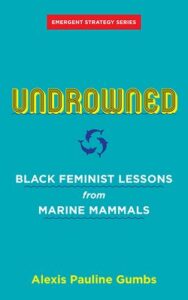
Alexis Pauline Gumbs, Undrowned
Undrowned is the best book I read this year and very possibly my favorite book ever. I keep re-reading it. I often read it in the bathtub. One time I accidentally dropped it in the water and now all the pages have waves in them, which feels even more right. Alexis deep dives into the world of marine mammals as an apprentice to their wisdom, and as an explorer of language and liberation. The text itself contains worthy lessons.
But it’s the poetry that sweeps you away. Alexis’s voice flows between scientific observation to intimate meditation. She writes like a body that belongs in the water. And, like a body bigger than an author, bigger than a book, bigger than a blue whale. Every time I read a passage from Undrowned I get a little more free. It makes me feel connected and grateful and wild and tender and alive, so alive, and so in love with living.
–Christy NaMee Eriksen is a Kundiman fellow working on her first book of poems
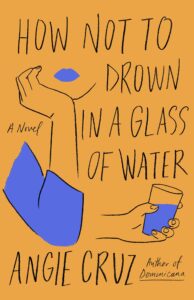
Angie Cruz, How Not to Drown in a Glass of Water
What a joy to immerse myself in this elegantly compact, impactful, and vibrant novel by the talented Angie Cruz. Cara Romero, our narrator, is an out-of-work Dominican woman in her fifties living in Washington Heights during the Great Recession. During twelve sessions with a city employee, a younger Dominican American woman, tasked with helping Cara find a job, Cruz engages with weighty issues of gentrification, poverty, globalization and its displacements, discrimination, bureaucratic cluelessness to the rich interior life of its petitioners with a touch so light, and a voice so pitch-perfect that the issues leave the world of abstraction and become palpable, penetrating, and deeply felt.
An added delight for the bilingual reader is the pitch-perfect narrative voice which so unapologetically embraces both English and Spanish, creating a back-and-forth playfulness and lyricism that surprise and delight. This novel is not just a favorite read of 2022 but it joins my shelf of all-time favorite novels. Doble Brava to Cara and to Cruz for this tour de force book.
Manuel Muñoz’s new short story collection, The Consequences, shows a mastery that’s hard to pin down. Set in California’s Central Valley, the stories depict the lives and souls of Mexican and Mexican-American men and women with an abiding tenderness and presence of heart which signals a moral imagination at work—but without a fingerprint of preachiness or polemics in the writing.
The stories are permeated with tenderness and an open-eyed clarity that make you feel you’ve touched bottom in the humanity of each of the characters. Manuel Muñoz is one of the best “quiet” storytellers out there. A wonder of a writer.
–Julia Alvarez, author of Afterlife
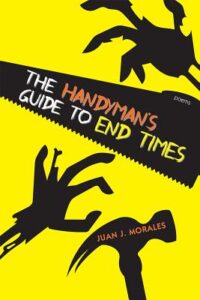
Juan Morales, The Handyman’s Guide to the End Times
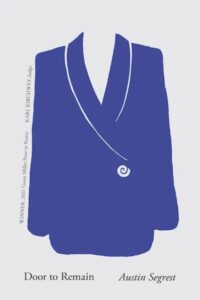
Austin Segrest, Door to Remain
Poets saw me through 2022. I loved Tayi Tibble’s Poūkahangatus, which explores the modern Maori experience with irresistible humor and daring. Juan Morales’ The Handyman’s Guide to the End Times comforted me at a time when I needed it, by radiating a kind of humble perseverance in the face of great loss. And finally I was moved by Austin Segrest’s Door to Remain, a clear-eyed elegy to a mother who died of anorexia, and a mediation on the limits (and limitlessness) of human love.
–Amanda Rea is a writer living in Denver
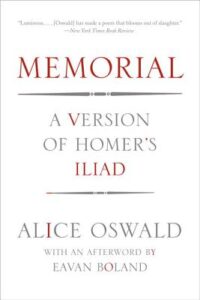
Alice Oswald, Memorial: A Version of Homer’s Iliad
This year I read Memorial by Alice Oswald in January, and in February there was a new war in Europe. I was shaken by Oswald’s reinvention of the Iliad, removing Achilles’ rage, leaving the “energeia” to speak, casting light at what is lost in war: the singularity of life. The repetition of the stanzas is merciless and powerful at the same time, and this is a work that rekindles humanity.
–Gunnhild Øyehaug, author of Evil Flowers: Stories, forthcoming in 2023 from Farrar, Straus & Giroux

Taeko Kono, trans. Lucy North, Toddler Hunting and Other Stories
Written by Taeko Kono in the 1960s, Toddler Hunting and Other Stories blow up any idea we may have of marriage, motherhood and femininity, like an empty can being kicked by someone with all their might. The most important Japanese author of her generation—she was only one year older than Yukio Mishima—wrote about unspeakable desires with such detachment and precision that the reader, instead of being shocked, feels a burning stupor. Overcome the astonishment the questions arrive. Why do we cause pain? Why do we crave pain? And what to do when pleasure meets pain? You have to read them little by little, like certain dangerous foods that only in small doses we are able to digest.
–Andrés Felipe Solano, author of Los días de la fiebre: Corea del Sur, el país que desafió al virus

Liu Xinwu, The Wedding Party
I read approximately a bazillion books (or at least, well over 200) as a judge for ALTA’s Best Translated Book in Prose Award, and one that I would recommend most highly is The Wedding Party, by Liu Xinwu and translated by Jeremy Tiang. On original publication in China it was made into a super popular TV miniseries and it is totally binge worthy—it’s rich with the atmosphere of Beijing in the 80’s, it’s hilarious, and Tiang’s translation absolutely sings. It immediately claimed a spot on my “favorites of all time” shelf and with its family warmth and drama, it’s actually perfect reading for the season.
–Annie Tucker, translator of Kitchen Curse: Stories, by Eka Kurniawan












